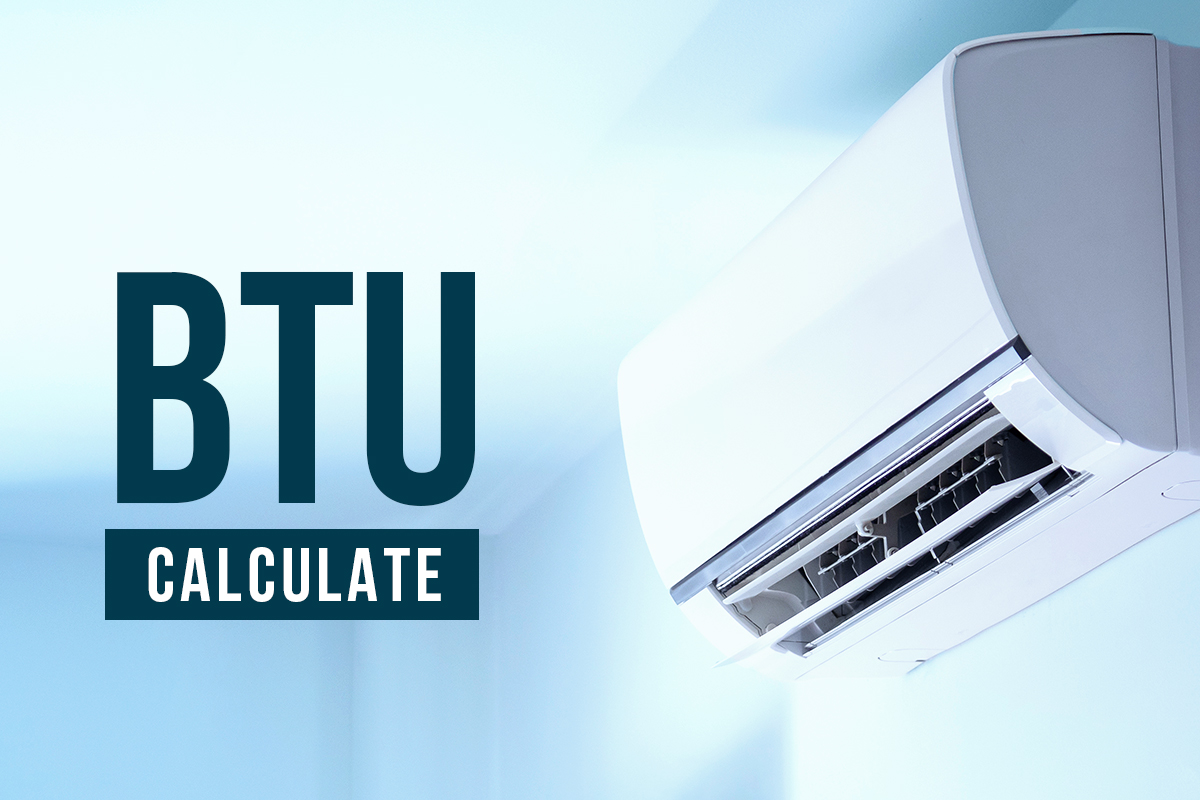If you’re looking for a new air conditioner, you’ve probably come across the term BTU. These letters indicate something important about the air conditioner and how effectively it cools your home. What does BTU for air conditioning mean? The following is a guide to everything you need to know about BTUs in the context of air conditioning.
BTU for Air Conditioning: What Does BTU in Air Conditioning Mean?
A British Thermal Unit, or BTU per hour, is a unit that determines the cooling and heating power of an air conditioner unit. In simple terms, the bigger the BTU, the more cooling effect an AC unit can provide for a designated space. Although it seems theoretically easy to calculate the required BTUs, it’s a challenging task as many factors need to be considered. You don’t want a 14,000 BTU window air conditioner for a small 12×12 (144 sq. ft.) room because it unnecessarily increases your energy bill. In contrast, you don’t want to get steaming hot in the summer because you bought a 6,000 BTU portable air conditioner for a 1,000 sq. ft. apartment.
How to work BTU for air conditioning? Our team of professionals at RC Cooling will visit your home or business, measure the space, and give you a proper indication of the exact capacity of the air conditioner you should purchase. Visit our website or give us a call today!
How to Work Out BTU for Air Conditioning
To calculate the size (BTU capacity) of the air conditioner you need for a room, multiply the room’s length by its width. Then multiply it by 25 BTU to get an ample cooling capacity for the space under different weather conditions. For example, if the room is 15 feet long and 12 feet wide, it comes to 180 square feet. Multiply 180 sq. ft. by 25, and you get 4,500 as the BTU capacity.
If you’re looking for a trusted expert to guide you on purchasing air conditioning units, give us a call at RC Cooling! Our qualified technicians will visit your home and give you a quotation at no added cost!
The Benefit of Getting Your AC Installed by a Professional Team
Apart from correct AC installation according to manufacturers’ specifications, our team at RC Cooling will do a thorough inspection of your AC units. We will analyse your home, identify problem areas (like high humidity or inconsistent cooling), and evaluate available systems to ensure you’re getting the best AC system for you, your budget, and the climate. Professional technicians know the safety precautions and local codes to comply with therefore, an AC installed by an expert will result in better performance and improved efficiency.
Is BTU the Same for Heating and Air Conditioning?
BTUs for Air Conditioners
While we shop around to purchase an AC or heating unit for our home or office, we often see the very common acronym “BTU” on the product specifications. The BTU for an air conditioner isn’t the same as a heater. BTU on an air conditioner unit refers to the amount of heat the unit can remove from the air in a specific area per hour, also specified as BTU/hr. in most AC units. If an AC unit is specified as 20,000 BTU per hour, it can remove 20,000 BTUs of heat from the air within an hour.
BTUs for Heating Systems
BTU is a very common and essential specification for almost all heating systems. It’s often used to measure the heating efficiency of heaters or furnaces. A heating system rating will help determine how much heat is needed to warm a room. A low BTU heating system is usually meant for a small bedroom or office. You’ll often notice BTU specifications listed in the heating units are read as BTU input. The BTU input will indicate how much fuel energy the heater will consume within an hour.
BTU Units in AC Units
Different AC units have different BTUs. Below we have listed the ranges of BTU of different types of air conditioner units, in general:
- Portable air conditioners: 8,000 – 12,000 BTU
- Split system air conditioners: 9,000 – 36,000 BTU
- Window mounted air conditioners: 3,000 – 25,000 BTU
How to Use BTU to Select the Correct Aircon
We’ve shown you the math needed to calculate the correct BTU and the importance of choosing the suitable AC capacity. Now to make your life even easier, we’ve taken the most common room sizes and made a table for easy reference.
| Area To Be Cooled (square feet) | Capacity Needed (BTUs per hour) |
| 100 to 150 | 5,000 |
| 150 to 250 | 6,000 |
| 250 to 300 | 7,000 |
| 300 to 350 | 8,000 |
| 350 to 400 | 9,000 |
| 400 to 450 | 10,000 |
| 450 to 550 | 12,000 |
| 550 to 700 | 14,000 |
| 700 to 1,000 | 18,000 |
| 1,000 to 1,200 | 21,000 |
| 1,200 to 1,400 | 23,000 |
| 1,400 to 1,500 | 24,000 |
| 1,500 to 2,000 | 30,000 |
| 2,000 to 2,500 | 34,000 |
How to Make Adjustments for Your BTU Calculations
Aside from getting your desired BTU by following the general formula mentioned above, you should also pay attention to other factors that could affect your calculation. It may seem practical, but calculating the correct BTU is not as straightforward as you imagine. In this respect, you can contact RC Cooling for a professional estimation.
- If the room or space is heavily shaded and has insulated roofing, adjust the value by decreasing the BTU calculation by 10%–20%.
- For rooms in direct and constant contact with the sun, it’s always a good idea to increase the BTU calculation by 10%–20%. This also applies to rooms with large windows.
- If you’re installing an air conditioner in the kitchen, increasing the BTU calculation by 4,000 units is recommended.
- If the room has many occupants, you should add approximately 500–600 BTUs to the calculation for each person.
What Happens if You Get the Wrong BTU Calculation?
Choosing an AC with a BTU that is too low will result in longer cooling times, insufficient cooling capacity, and a higher electricity bill. A low BTU will result in the AC being underpowered and operating longer to bring the room to the best temperature. Since the AC unit is working longer, it impacts the electricity bill and will cost you more in energy in the long run. If you need to install a new air conditioner in your home or business, get in touch with RC Cooling. We’ll visit your site, inspect the property, and give you a free quotation. A leading air conditioning contractor since 2015, RC Cooling does air conditioning installation in Surrey, Sussex, and London.
Issues You’ll Face if the BTU is Too High
One would think that perhaps choosing a larger BTU would then mean the opposite and cool a room much faster, which would be good. However, this is a common misconception, and there are downsides to choosing an oversized AC unit. The issue here is that your AC is supposed to lower the temperature and remove moisture from the air to keep you feeling cool and comfortable. However, with an AC that is too large, while the cooling occurs very rapidly, the moisture extraction does not keep up. This will mean that while it’s cooler, the moisture will still be in the air and will start to condense. Furthermore, because the AC is too powerful, it’ll have to stop its cooling cycle and start again frequently. These extra cycles create an additional load on the compressor and cause your AC’s lifespan to reduce.
Does Optimal Size Guarantee Efficiency?
There are more considerations than BTU size when it comes to efficiency. One is the type of air conditioner; window units, for example, sit low, while a wall-mounted unit delivers cool air from a higher point. This cools a room more thoroughly. A system’s energy-efficiency ratio (EER) also counts, and always look for the ENERGY STAR label. Cleaning your filters, setting an optimal temperature, and using timers for cooling when it’s most needed also help improve efficiency.
Let Us Help You Choose the Right AC
Size is one of the most significant factors when installing a new air conditioner. Choosing the right size air conditioner requires knowing the area that needs to be cooled, among other factors. A professional air conditioning company must visit your home or business to calculate this correctly. Looking for the best air conditioning company in Surrey? RC Cooling, with its fully-certified team of AC engineers are ready to tackle anything from the most complex and large-scale construction projects to the smallest of repair jobs. We are driven by our commitment to excellence and go the extra mile to ensure our clients are satisfied with our work. Contact us today for a free quote!

